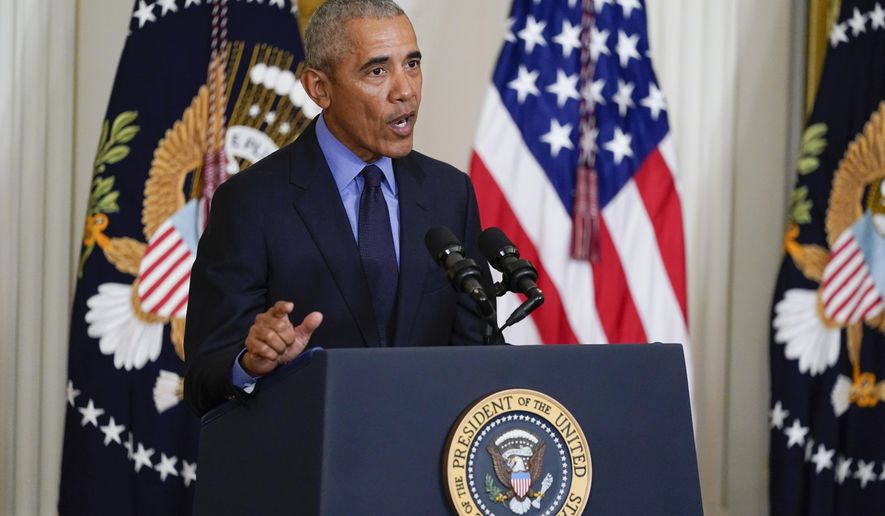Former President Barack Obama on Thursday put his stamp on the debate over how to stem the spread of disinformation online, calling for more transparency from social media companies and more government oversight and regulation of “toxic content” distributed on their platforms.
Speaking at the Stanford Cyber Policy Center, Mr. Obama said the “new information ecosystem is turbo-charging some of humanity’s worst impulses” and deepening cultural divides.
The trend will get worse if more is not done to slow the spread of harmful content, the former president argued.
“Each of us, whether we work at a tech company or consume social media, whether we are a parent, a legislation, an advertiser on one of these platforms, now is the time to pick a side,” Mr. Obama said. “We have a choice right now: Do we allow our democracy to wither or do we make it better?”
“That is the choice we face,” Mr. Obama said.
Mr. Obama said government regulations are needed to address the dark side of the digital revolution, which has left people confused as to what they should believe.
SEE ALSO: Democrats ramp up efforts to investigate election misinformation in red states
He said it is time to consider changes to Section 230 of the 1996 Communications Decency Act, which social media website owners have used as a legal shield to argue that they are not responsible for what users post on their forums.
“We do expect these companies to affirm the importance of our democratic institutions — not dismiss them, and to work to find the right combination of regulations and industry standards that will make democracy stronger,” Mr. Obama said.
He argued people must become smarter consumers of news to be better equipped to separate fact from fiction, and advocated for reinvesting in local news organizations.
Mr. Obama’s decision to lean into the issue is noteworthy given the way he tapped into emerging platforms such as Facebook and Twitter — both to raise money and get his message out — during his rise to the presidency in 2008. He largely steered clear of regulating the industry during his tenure.
Mr. Obama says now that he failed at the time to appreciate how susceptible people are to bogus information and conspiracy theories.
“People like [Russian President Vladimir] Putin and [former Trump adviser] Steve Bannon, for that matter, understand it is not necessary for people to believe this information in order to weaken democratic institutions,” he said. “You just have to flood a country’s public square with enough raw sewage.”
“You just have to raise enough questions, spread enough dirt, plant enough conspiracy theorizing that citizens no longer know what you believe,” he said. “Once they lose trust in their leaders, the mainstream media, political institutions, in each other, in the possibility of truth, the game is won.”
The battle over disinformation and regulation has picked up speed on Capitol Hill, with lawmakers calling for new rules that hold social media platforms such as Facebook and Twitter accountable when they are used to spread violence, hatred and disinformation that costs lives.
Democrats say former President Trump made the problem worse with his stolen election claims. They say bogus information online fueled the Jan. 6 attack on the U.S. Capitol and added to the skepticism over the need of coronavirus vaccines. Democrats have questioned why the companies took so long to remove former President Trump from their platforms.
Republicans, meanwhile, say big tech companies have abused their power by censoring conservative viewpoints they disagree with.
They say the companies have too much leeway when it comes to curbing speech and are committed to promoting a leftist agenda. The complaints have only grown louder after Twitter and Facebook limited the circulation of a New York Post article before the 2020 election about emails that apparently came from the computer of presidential son Hunter Biden, emails that later proved to be authentic and embarrassing for both Mr. Biden and his father.
Mr. Obama said the United States should be leading the discussion on the world stage and said political leaders in Washington must come together to address the problem.
“If the vast majority of elected Republican officials keep insisting that there is nothing wrong with saying an election is stolen without shred of evidence, when they know better, this isn’t going to work,” he said.
• Seth McLaughlin can be reached at smclaughlin@washingtontimes.com.




Please read our comment policy before commenting.